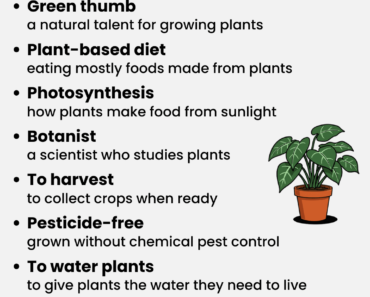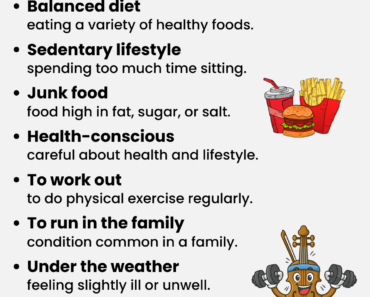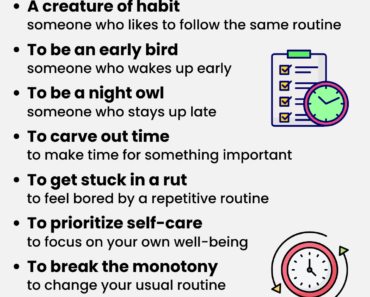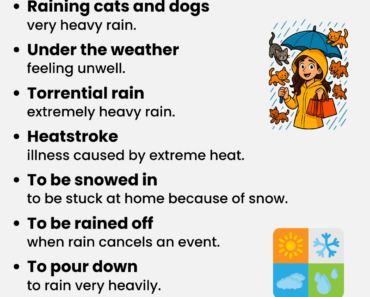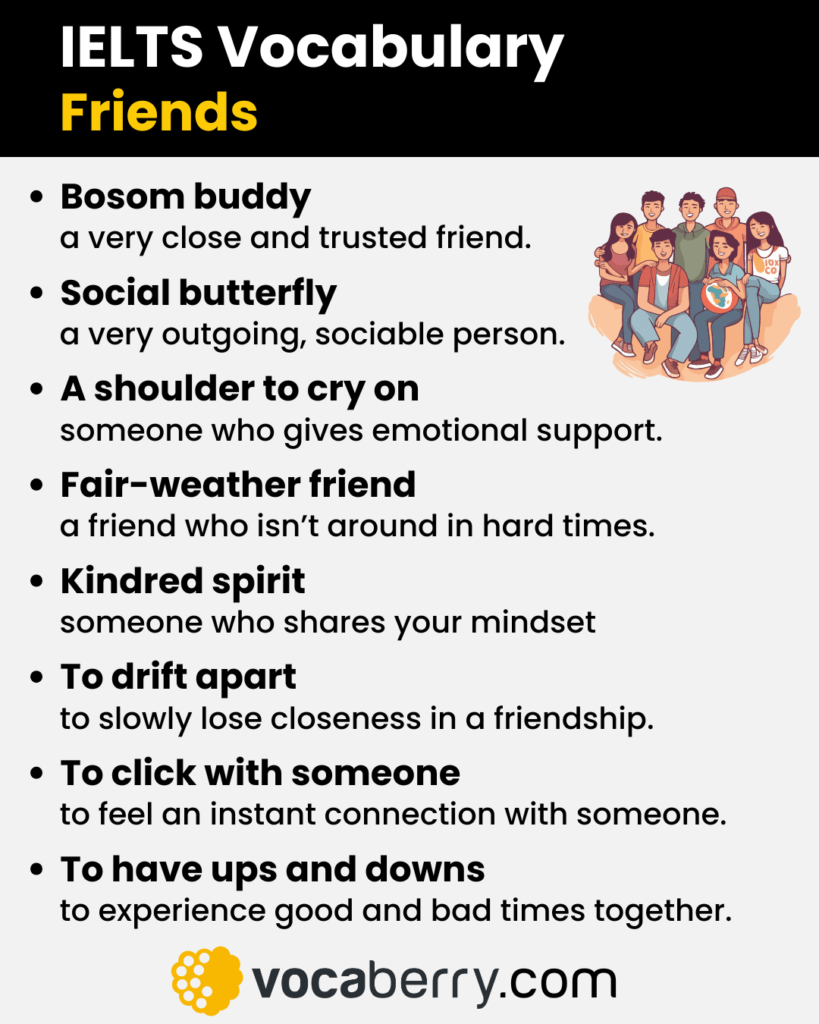
Friends is a common topic in the IELTS Speaking test. Examiners may ask you about your close friends, how you spend time together, how your friendships have changed over time, or what qualities make a good friend. In this guide, you’ll learn useful IELTS vocabulary for the topic of friends with clear definitions, followed by IELTS Speaking Part 1, Part 2, and Part 3 questions with sample answers.
IELTS Vocabulary for Friends
Here is some useful IELTS vocabulary for talking about friends with clear definitions. These words and phrases will help you give better answers in the IELTS Speaking test.
Types of Friends
- Pal – an informal word for friend.
- Buddy (US) – a casual or friendly companion.
- Mate (UK) – informal word for friend, commonly used in the UK.
- Bestie – slang for best friend.
- Frenemy – someone who pretends to be a friend but is actually a rival.
- Bosom buddy – a very close and trusted friend.
- Acquaintance – someone you know but aren’t close with.
- Confidante – someone you trust and share personal secrets with.
- Best friend – your closest and most trusted friend.
- Close friend – someone you know well and trust.
- Childhood friend – a friend you’ve known since you were young.
- Old friend – someone you’ve known for a long time.
- Mutual friend – a person who is a friend of two people.
- Casual friend – someone you know but aren’t very close to.
- Circle of friends – the group of friends you spend time with.
- True friend – a friend who is loyal, honest, and supportive.
- Fair-weather friend – a friend who is only around during good times.
- Lifelong friend – a friend you’ve had for most of your life.
- Long-standing friend – a friend you’ve had for many years.
Forming and Maintaining Friendships
- To make friends – to begin a friendship with someone.
- To become friends – to start being friends with someone.
- To build a friendship – to develop a close relationship with someone.
- To maintain a friendship – to keep a friendship strong over time.
- To cultivate a friendship – to develop a friendship over time.
- To foster a bond – to build a close emotional connection.
- To build a strong bond – to develop a close connection.
- To reconnect – to get back in touch after losing contact.
- To lose touch – to stop communicating with someone.
- To keep in touch – to continue communicating with someone.
- To go way back – to have known someone for a long time.
- To drift apart – to gradually lose closeness over time.
- To fall out with – to argue and stop being friends.
- To make up with – to become friends again after an argument.
- To support each other – to help one another in good and bad times.
- To be well-matched – to be very compatible or similar with someone.
- To have friends in high places – to know influential or powerful people.
Spending Time & Interacting
- To hang out – to spend time relaxing with friends.
- To meet up – to get together with someone socially.
- To get to know someone – to learn more about a person over time.
- To keep someone company – to stay with someone so they’re not alone.
- To enjoy each other’s company – to like spending time together.
- To lend a hand – to help a friend when they need support.
- To be there for someone – to support a friend emotionally.
- To have someone’s back – to stand by and support someone.
- To confide in someone – to share personal thoughts or problems.
- To rely on someone – to trust or depend on someone.
- To share secrets – to tell personal things to a trusted friend.
- To click with someone – to instantly feel connected or comfortable.
- To get along with – to have a good relationship with someone.
- To have a lot in common – to share similar interests or opinions.
- To see eye to eye – to agree with someone on most things.
- To forgive and forget – to stop being upset after a disagreement.
- To have ups and downs – to experience good and bad times in a friendship.
Describing People & Qualities in a Friend
- Loyal – always supportive and faithful.
- Reliable – someone you can count on.
- Trustworthy – someone you can confide in without worry.
- Understanding – someone who listens and sees your point of view.
- Caring – showing kindness and concern for others.
- Supportive – encouraging and helpful.
- Good listener – someone who listens carefully and patiently.
- Easy-going – relaxed and pleasant to be around.
- Outgoing – sociable and confident with people.
- Social butterfly – someone who enjoys socializing with many people.
- Like-minded – having similar opinions, values, or interests.
- Sense of humor – the ability to laugh and enjoy funny things.
Friendship-Related Idioms & Phrases
- Near and dear to someone – very important or emotionally close to someone.
- To go through thick and thin – to support someone in good and bad times.
- To get on like a house on fire – to become very close friends very quickly.
- To be on the same wavelength – to share the same ideas or way of thinking.
- To bury the hatchet – to end an argument and become friends again.
- To patch things up – to repair a damaged friendship.
- To hit it off – to form a connection with someone immediately.
- To stand the test of time – to remain strong and lasting over the years.
- To outgrow a friendship – to grow apart due to life changes.
- A shoulder to cry on – someone who offers emotional support.
- Friendship goals – an ideal or inspiring type of friendship.
- Kindred spirit – someone who shares your values or way of thinking.
IELTS Speaking: Friends Questions & Answers
In this section, you’ll find IELTS Speaking Part 1, Part 2, and Part 3 questions on the topic of friends with sample answers. These examples show how the friendship-related vocabulary can be used in your responses during the test.
IELTS Speaking Part 1 – Friends
Do you have a best friend?
Yes, I do. My best friend is someone I’ve known since childhood, and we’ve always had a strong bond. She’s incredibly reliable and has always been there for me through ups and downs, which makes our friendship really meaningful.
How often do you spend time with your friends?
I try to hang out with my friends at least once or twice a week. We usually meet up at a café or go for a walk just to catch up and enjoy each other’s company. Spending time like that helps us stay close and keep in touch despite our busy lives.
Are your friendships more important now or when you were younger?
They’ve definitely become more important over time. When I was younger, friendships were mostly about having fun, but now I value things like loyalty and having a confidante who truly understands me. I’ve also become more selective and prefer like-minded people I can genuinely connect with.
Have your friendships changed over the years?
Yes, a lot. I’ve drifted apart from some people due to distance or life changes, but I’ve also made new friends who really suit the person I’ve become. The ones who have stood the test of time are the ones I value most.
Do you think it’s easy to make new friends?
It depends. In casual settings, it’s easy to meet acquaintances, but forming a true friendship takes time. You really need to click with someone and have a lot in common to feel a real connection and foster a bond that lasts.
IELTS Speaking Part 2 – Friends Cue Card
Describe a close friend you have.
You should say:
- who the person is
- how you met
- what you usually do together
- and explain why you consider this person a close friend.
Sample Answer:
I’d like to talk about my best friend, Elif, who is honestly one of the most important people in my life. We’ve been friends for over fifteen years, and she’s definitely a lifelong friend, someone I’ve shared so many memories with. We first met at primary school, and even though we were just acquaintances at first, we started spending more time together and eventually became close friends.
At the beginning, we were part of the same circle of friends, but over time, we developed a strong bond and started to hang out just the two of us. I remember how naturally we clicked. It felt like we were instantly on the same wavelength. She’s the kind of person I can talk to for hours without getting bored. We always have a lot in common, and we tend to see eye to eye on most things, whether it’s opinions, values, or just general life goals.
One of the reasons I value our friendship so much is because it’s stood the test of time. Even when we moved to different cities, we made the effort to keep in touch, and we’ve never really drifted apart. Of course, we’ve had our fair share of ups and downs, but we always manage to make up quickly because we both care about the friendship. She’s someone I can confide in, and I know she’ll always have my back. I honestly see her as more than just a friend. She’s my confidante, my shoulder to cry on, and my biggest cheerleader.
Nowadays, we try to meet up whenever we can, even if we’re both busy. Whether we’re going for coffee, having dinner, or just staying in and chatting, I always enjoy her company. She’s incredibly loyal, trustworthy, and has a great sense of humor, which makes every moment spent with her enjoyable. She’s also a great listener and always lends a hand when I need support.
To me, a true bosom buddy is someone who’s reliable, understanding, and always there, no matter what. Elif fits that description perfectly. I feel lucky to have her in my life, and I know we’ll continue to be kindred spirits for years to come.
IELTS Speaking Part 3 – Friends Discussion
IELTS Speaking Part 3 questions about friends may ask you to compare friendships at different life stages, discuss how social media affects human connection, and explore the importance of loyalty and trust. You might also be asked how friendships evolve or whether close relationships still matter in today’s fast-paced world.
How can people overcome conflicts in a friendship?
Conflicts are natural in any close relationship, but the key is communication and empathy. If two friends argue, it’s important to patch things up rather than ignore the issue. A true bosom buddy will be willing to listen and work through problems. I had a disagreement with a friend recently, but we managed to bury the hatchet because we both cared about the friendship. Having a sense of humor and being willing to forgive and forget also helps a lot. Real friendship is about growing together, not giving up at the first sign of trouble.
What qualities do you think are important in a good friend?
For me, a good friend should be loyal, trustworthy, and someone who genuinely listens. I really appreciate people who are supportive and there for you in both good and bad times. A great friend is also someone who shares your values or interests. In other words, someone who’s like-minded. My bestie, for example, is someone I can confide in without hesitation, and we always have each other’s backs. Having a sense of humor is a bonus too, because laughing together really strengthens the bond. A true friend should make you feel comfortable being yourself.
Why do some people have difficulty making friends?
Some people find it hard to make friends because they’re shy, or they’ve had negative experiences in the past. Others may struggle to find someone they click with, especially if they don’t have much in common with the people around them. I also think the fear of rejection can hold people back. Making a real connection takes vulnerability, and not everyone feels comfortable opening up. In my experience, the best friendships happen naturally when you’re involved in shared activities, and you slowly foster a bond. You don’t need to be a social butterfly, because just being genuine is enough.
Do you think friends influence each other’s behavior?
Definitely. Friends have a big impact on our thoughts, habits, and even our decisions. A close friend can motivate you to grow, while a frenemy might bring negativity. I’ve had both types in my life, and I can say that being around a like-minded person encourages healthier choices and more positive thinking. We often see eye to eye, and that makes it easier to support each other. On the other hand, if you’re surrounded by people who don’t treat you well, it’s harder to feel confident. That’s why choosing reliable and loyal friends is so important.
More IELTS Vocabulary Topics
If you found this lesson useful, explore other IELTS Speaking topics to expand your vocabulary and practice with sample answers:
- IELTS Vocabulary: Accommodation
- IELTS Vocabulary: Advertisement
- IELTS Vocabulary: Animals
- IELTS Vocabulary: Art
- IELTS Vocabulary: Artificial Intelligence
- IELTS Vocabulary: Books
- IELTS Vocabulary: Childhood
- IELTS Vocabulary: Crime and Punishment
- IELTS Vocabulary: Culture and Traditions
- IELTS Vocabulary: Daily Routine
- IELTS Vocabulary: Education
- IELTS Vocabulary: Environment
- IELTS Vocabulary: Family
- IELTS Vocabulary: Fashion and Clothes
- IELTS Vocabulary: Films
- IELTS Vocabulary: Food & Diet
- IELTS Vocabulary: Gifts
- IELTS Vocabulary: Health
- IELTS Vocabulary: Hobbies
- IELTS Vocabulary: Hometown
- IELTS Vocabulary: Money
- IELTS Vocabulary: Museums
- IELTS Vocabulary: Music
- IELTS Vocabulary: Plants
- IELTS Vocabulary: Shopping
- IELTS Vocabulary: Social Media
- IELTS Vocabulary: Sports
- IELTS Vocabulary: Technology
- IELTS Vocabulary: Transport
- IELTS Vocabulary: Travel
- IELTS Vocabulary: Weather
- IELTS Vocabulary: Work & Jobs

